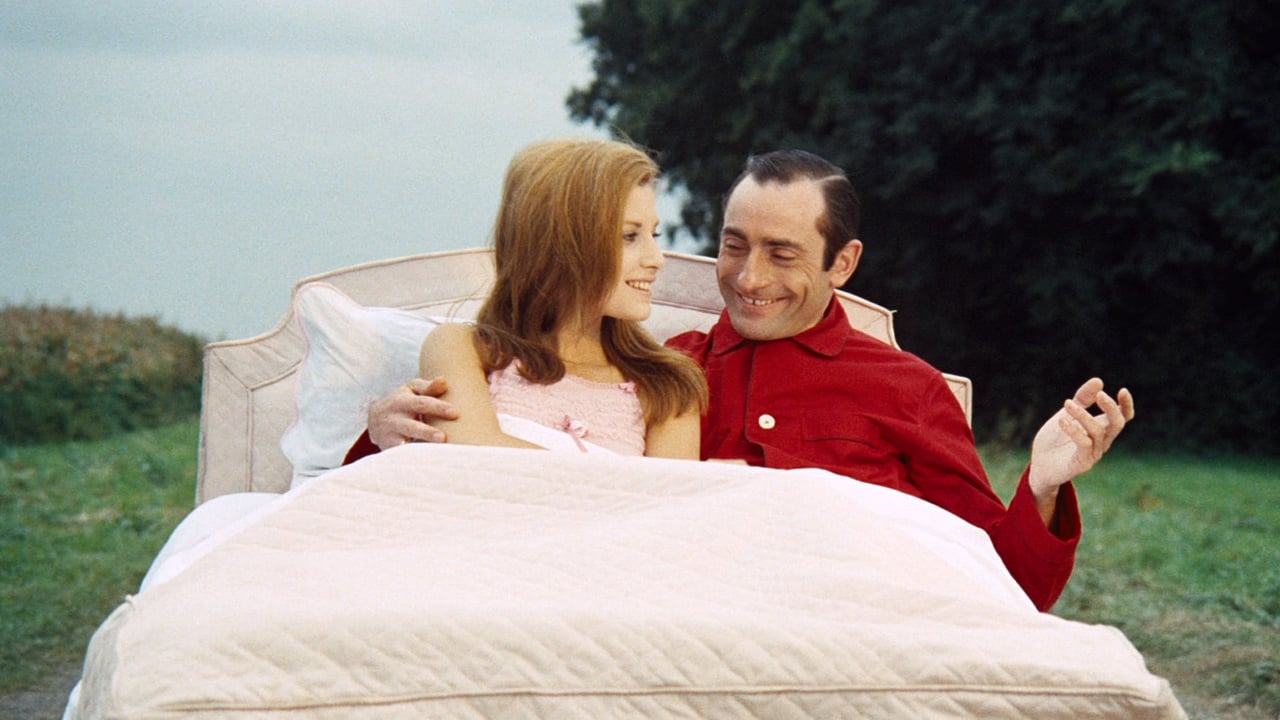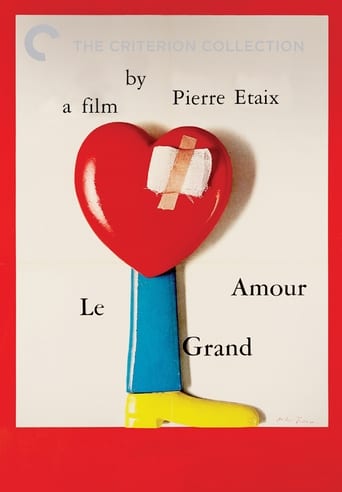

Following in the tradition of "Monsieur Hulot's Holiday", "Le Grand Amour" uses as little dialogue as possible. However, there is more dialogue in "Le Grand Amour" and the viewer feels more involved, whereas in "Monsieur Hulot's Holiday", the viewer feels more like a voyeur, just watching the happenings that occur around him."Le Grand Amour" also has a theme; it is not just a slice of life. The protagonist, Pierre (Pierre Etaix, who also wrote and directed the film), lives his life rather passively. He is affected and influenced by the opinions of others, by gossip, and by the institutions and social forms that exist. Even when he seeks to assert himself, it still feels like he is just shrugging off one convention for another.The style of the film is much like the silent film comedies of earlier years. But it seamlessly strays into flights of fancy, like the scenes where he fantasizes about his secretary and those involving dreams (a la Woody Allen).The film is very creative in its use of sound effects. Notice, for example, the background sounds when certain characters are on screen.The film is also filled with vignettes and ancillary comic touches that add to its charm, like the waiter whose curiosity about the restaurant patrons affects his performance and who, at one point, actually interacts with a memory recounted by Pierre in voice over.The film has a charming, light-hearted view of life and marriage, with a self-deprecating sense of humor.
... View MorePierre Etaix appeared to emerge fully-formed, make a mild impact and then disappear without trace. Somehow or other he has now been 'rediscovered' and his small canon of films is being made available on DVD. What seems clear is that he had a definite slant on life and filmmaking and The Great Love is, I'm guessing, as good an example as any. The actual plot could not be more basic; a ladies man finally marries and settles down to a life of domesticity complete with the job in his father-in-law's business, a tannery. The years pass, he wonders did he make a mistake, what if he had married one of his other girl friends, what if he had remained a bachelor ... What lifts it out of the run-of-the-mill are the quirky,almost surreal touches with which Etaix studs the film. Certainly worth a look.
... View MorePierre Étaix directed, co-wrote and starred in this very unusual and often surreal film. It does have its slow moments, but its eccentric sense of humor make it well worth seeing.When the film begins, you see Étaix about to get married--at which point you are shown a flashback where this character explains to the audience his previous love life as well as what led him to marry Florence (played by the woman Pierre Étaix actually married in 1969). This is the first of MANY occasions where the film breaks through the fourth wall--the invisible barrier between the actors and the audience.Now the film jumps ahead and the couple is now approaching middle age. The husband is quite successful (working for his father-in-law) and the couple is quite happy. However, a couple nosy biddies see the husband doing innocent things--and their dirty minds misinterpret it. They think he's cheating on his wife and eventually their gossip leaks to the wife and she leaves him--at least temporarily. She does return, but the incident actually gets the husband looking at his own life--the stagnation and the possibility of having an affair with his much younger secretary.At this point, some of the strangest leaps from the plot occur--and it becomes very surreal. My favorite was a whimsical dream where the husband finds himself in bed and the bed is chugging down the street like a car! And, ultimately, the secretary joins him. Many more wacky surreal touches occur--but I don't want to spoil the film.The best way to describe this film is a French comedy with hints at the sort of film Woody Allen would soon make--with the strange surreal bits as well as the questioning about one's direction in life. As I mentioned above, it does have a few slow moments but it also has many magical ones that make the film worth your time. A strange but satisfying comedy about mid-life.
... View MoreI had the wonderful experience of seeing Le Grand Amour at its New York premiere last night (Friday, October 19, 2012). The screening was at the Film Forum, the renowned movie house where a Pierre Étaix retrospective is currently being held. The film was preceded by Étaix's Oscar-winning 1962 short Heureux Anniversaire. To the delight of all who were in the audience, M. Étaix was at the screening (his very first trip to NYC!), first to introduce Le Grand Amour and then again for a generously lengthy post-film Q&A. At nearly 84 years old, Étaix's sense of humor is as lively as ever; when asked who his favorite contemporary directors were/are, he joked about it being Clint Eastwood. (The actual answers: William Friedkin and Stanley Kubrick. Étaix also mentioned being a fan of Hitchcock.) As for Le Grand Amour, the film is a charming look at married life in all its most comedic - and sometimes poignant - moments. The gags are fantastic and the emotional aspects parts of the story feel very real. Catch Le Grand Amour if you can, although I'm not sure where you would be able to find it in America (besides at the Film Forum) since M. Étaix's directorial efforts are not yet available on DVD here. It's a real shame since his talents have been forgotten for far too long. Le Grand Amour makes clear what his great loves were (and, in some ways, still are): comedy, filmmaking and his co-star/wife at the time, Annie Fratellini.
... View More